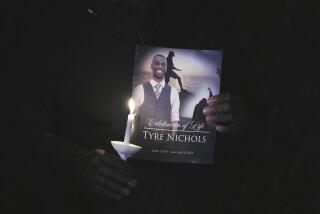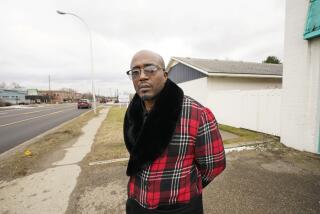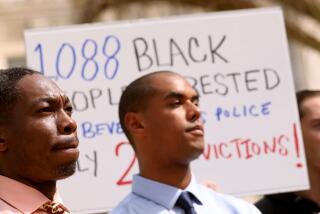Justice Department sues Ferguson, demands end to biased policing practices

Atty. Gen. Loretta Lynch, in an undated image, announced that the Justice Department had filed suit against Ferguson, Mo., over a proposal to revamp its policing practices.
The city of Ferguson, Mo., must now defend itself against a lawsuit from the U.S. Department of Justice after months of negotiations failed to bring a compromise on a package of reforms designed to revamp the city’s controversial policing practices.
U.S. Atty. Gen. Loretta Lynch announced the action against Ferguson on Wednesday, a day after federal officials said Ferguson’s City Council tried to unilaterally modify and pass its own version of reforms.
A “disappointed” Lynch criticized Ferguson’s city leaders for trying to amend a package of reforms that had been hammered out between city and federal officials after seven months of what she called “painstaking” negotiations. The reforms include the mandatory use of body cameras and a repeal of city laws that allow police to jail people for not paying fines.
In a 6-0 vote Tuesday night, the City Council said it would only accept the package if the Justice Department agreed to several conditions that included limits on staffing mandates and longer deadlines.
“Every part of that document was discussed and was negotiated extensively,” Lynch said in a televised news conference in Washington, D.C.
Lynch added, “The city was well aware that had they decided not to accept it, they were choosing litigation.”
Ferguson became a national symbol of troubled policing after the August 2014 police shooting death of unarmed, black 18-year-old Michael Brown by a white police officer led to riots and lengthy protests in the predominantly African American St. Louis suburb.
An ensuing Department of Justice investigation found no reason to charge the officer who shot Brown, Darren Wilson, who said Brown had charged at him. Federal investigators could not prove activists’ claims that Brown had his hands up when Wilson shot him.
But a separate department investigation found that the city’s police force systematically racially profiled and harassed black residents. The Justice Department report released last March found that the city’s overwhelmingly white police force set dogs on black residents and that officers were seven times more likely to use force on black residents than whites. Black drivers were almost twice as likely as white drivers to be searched during a traffic stop even though they were less likely to be found in possession of something illegal.
Investigators also found that police and municipal court officials had traded racist emails.
After the report was released, several officials resigned, including the city’s police chief, Tom Jackson, and negotiations began over a court-monitored package of reforms.
The lawsuit asks a federal judge to order Ferguson’s police to stop the unconstitutional policing practices outlined in the 56-page complaint and to order city officials to adopt “policies, procedures, and mechanisms” that will identify and prevent similar misconduct in the future. A Ferguson city spokesman did not immediately respond to a request for comment Wednesday afternoon.
From the start, Ferguson officials had been concerned over what implementing a consent decree might cost the city. It’s been common for large police departments to face consent decrees after Justice Department investigations found unconstitutional police practices.
But Ferguson, which has 21,111 residents, is much smaller than the cities the Justice Department typically investigates. City officials said that residents had also been concerned about the cost when the city presented the drafted agreement for public comment.
Concerns about the cost and the “comprehensive and far-reaching scale of the agreement were voiced,” the city of Ferguson said in a statement after voting to modify the negotiated agreement Tuesday night. “The conditions of approval address those concerns to some extent.”
The city had clearly hoped — wrongly, it turns out — that the vote to present new changes to the Justice Department would avoid a lawsuit. In its Tuesday night statement, the city said the council’s vote to modify the agreement “avoids the time and cost of litigation and allows the City to continue its focus to ensure constitutional policing and court practices.”
Federal officials immediately showed their displeasure. Justice Department civil rights head Vanitas Gutta said the Tuesday night vote created an “unnecessary delay in the essential work to bring constitutional policing to the city” and vowed to take legal action.
The Justice Department’s lawsuit, filed in the U.S. District Court in the eastern district of Missouri, accused Ferguson of violating the 1st, 4th and 14th Amendments.
Follow @MattDPearce for national news.
MORE ON FERGUSON
A year later, Ferguson quietly struggles forward
Ferguson reaches tentative police reform deal with Justice Department
Op-Ed: The Ferguson effect in Los Angeles – more crime
More to Read
Start your day right
Sign up for Essential California for news, features and recommendations from the L.A. Times and beyond in your inbox six days a week.
You may occasionally receive promotional content from the Los Angeles Times.







